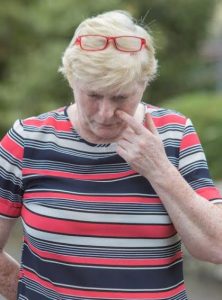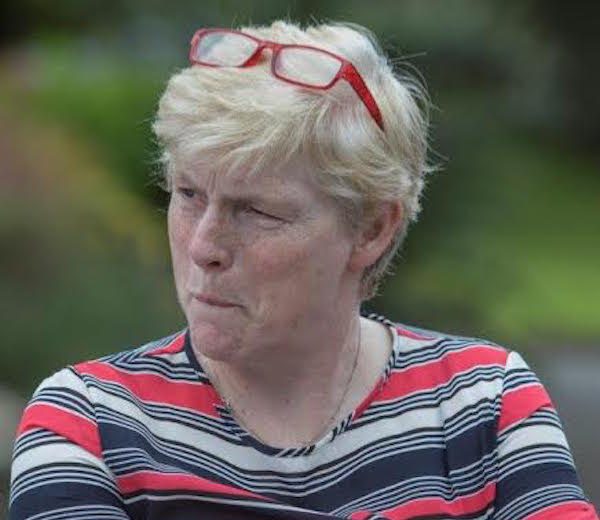From the heights of Ard na Meala in St Johnston, the waters of the Foyle glisten in the distance below and the scene is almost postcard perfect.
For Geraldine McDaid, the image brings a constant reminder of the evening a parent’s worst nightmare came true.
The May Bank Holiday in 2008 was like most others in the sleepy east Donegal village – until disaster struck in the mid-evening sun.
Three young boys were playing in the river when one of them, 13-year-old Brian McDaid, got stuck in mud and was swept away by the swirling tide.
The image is a daily reminder for Geraldine of the day her ‘wee man’ was snatched by the sometimes-vicious waters.
Last Friday, a service took place on the same evening commemorating a fateful evening 100 years ago when four youngsters – George Quigley, Patrick O’Donnell, James Dowds and James Orr – drowned in the Foyle.
A tree in memory of those who have lost their lives in the Foyle was unveiled and Geraldine McDaid was asked to perform the duty of cutting the ribbon.
Soon, a memorial made of Glentown Stone will be erected nearby and etched upon it will be the names of those who lost their lives in the adjacent river. The tranquil waters mask a sea of devastation for some, but a permanent structure will now mark out those victims even for those who may be unaware of the secrets of the tide.
“To be asked to be a part of the commemoration of all the people who lost their lives in that stretch of the river, it was very poignant,” Geraldine says.
“They wanted me to be involved on the evening.
“It’s nice to know that my wain will always be remember, long after me, his brother and sisters are gone. It’s nice to know Brian’s name will be remembered around this town.”
Sharon Fischer, a descendant of George Quigley, one of the youngsters who drowned in 1917, flew over from Canada to be at the service, while relatives of Patrick O’Donnell, including local priest Fr Oliver McCrossan, were also in attendance.
“It was so nice to meet those people,” Geraldine says. “They were so glad to be a part of the service too. All the religions came together on Friday night.
“I’m so glad I live in a place like this. What they’ve done and tried to do for me, I could say ‘thank you’, but that’s a small phrase you say when you get a cup of tea in a house. That wouldn’t be big enough for the thanks that I have.”
The night of May 5, 2008, will forever be on the minds of Geraldine McDaid.
Brian and his friends went to play and, as most youngsters of the area have done, they ventured to the river.
Two of them came back and Geraldine cane still hear those haunting sounds of the 118 Rescue helicopter.
“There is a goodness and a badness in that water – I see it every day,” she says.
“Aww, it’s something I look at it so bloody angry at times. Why?
“I saw the helicopter. I heard it hovering over the Foyle. I remember wondering: ‘Is that where my wain is?’
“It moved over and I wondered again: ‘Is that where he is?’ I knew why they were there, but I didn’t want to accept why they were there. People were coming to my house, I knew why they were coming, but I didn’t want them there. If I accepted they were coming, I’d be accepting what was going to unfold.
“You don’t want to think about it being real. To this day, I still don’t remember leaving the graveyard on the day of the funeral.”

Geraldine McDaid in conversation with Donegal Daily’s Chris McNulty
A search was mounted around 3.30 in the afternoon and at around 9 that evening Brian’s body was recovered, following an exhausting comb of the river.
Geraldine remembers clearly talking with local fisherman Sammy Bovaird, oblivious to what was about to unfold. She can still see Brian’s dog, Shellby, tied to a post at the water’s edge and knowing deep down that Brian wouldn’t have left his trusted companion.
“We got the wain back and I’ll always be grateful for that, for the efforts of those man and the women who did so much to get my wain back that night,” Geraldine says.
“ I’ll never forget that. That God we did get him back. So many families don’t get the body back or they have to wait for weeks and, by that stage, the body is in an awful state.
“I remember the guard from the sub aqua team coming in, still in his wet gear, and I put him out. ‘Don’t tell me what you’re coming here to tell me. Get out. I don’t want to hear it.’ I didn’t want him to tell me what he was going to. He was the one who brought the body in.”
In the weeks, months and years since, Geraldine has been indebted to daughters Danielle and Araeya and son James.
“There were times when you couldn’t cry in the house,” she says. “Every time I’d sit down and be on the verge of breaking down, it would be: ‘Ma, can I get this?’, ‘Ma, can I get that?’.
“I was always glad for: ‘Ma, can I get?’. It kept me going on.”
Just over nine years have passed and Geraldine, as any mother would, wonders what might have been.
She says: “I always wonder what he’d be doing now. Would he have a girlfriend? Would I be a granny? Things like that.
“We had no wifi at that time, the Wii was just coming out. We have so much technology now and we don’t have Brian. I’d give them all back to get Brian back.
“I have everything belonging to him. His aftershave, his books, his school uniform, his Playstation and his games, and they’ll remain where they are.”
She believes that water safety and swimming should be taught as a matter of form in all schools – ‘Water is not your friend’, she adds – and in particular in areas like St Johnston, towns and villages that are built next to bodies of water.
And she remains appalled that the likes of the Foyle Search and Rescue and the Greencastle Coastguard have to battle for funding.
“They are life savers – they really are,” Geraldine says.
“You couldn’t credit those people enough. They bring so many people out of that water. Some of the sights they see are terrible. They should be supported way better than what they are.”
Tags:





